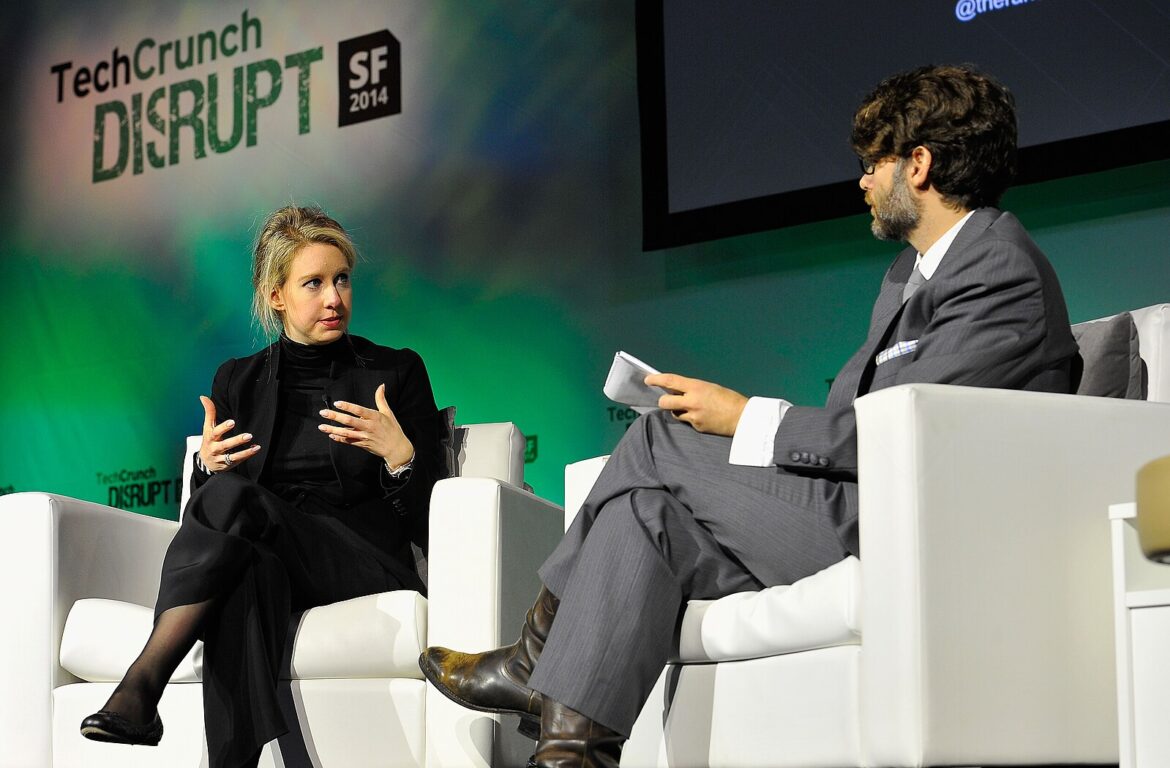In the hallowed halls of Silicon Valley, Elizabeth Holmes emerged as a prodigy. Young and charismatic, she harboured a vision that promised to revolutionize healthcare and became the face of innovation with her start-up, Theranos. The company’s meteoric rise painted a picture of a future where simple finger-prick tests could replace complex blood draws, offering faster, cheaper, and more efficient diagnostics. Yet, beneath this glossy exterior lay a tangled web of deceit and misinformation.
The unraveling of Theranos serves as a potent case study, not just for budding entrepreneurs but for the intricate world of international politics. At a glance, the realm of start-ups and geopolitics seem worlds apart. However, they share more in common than one might imagine. In both, reputation is paramount, and manipulation can be a tool wielded with finesse. The Theranos saga uncannily mirrors the games nations play on the world stage – where soft power seduces, misinformation misleads, and the consequences of broken trust reverberate far and wide. This article delves into this overlap, revealing how the strategies and pitfalls seen in the Theranos scandal can serve as lessons for understanding the volatile landscape of international politics.
Soft power, Innovation, and the Importance of Reputation:
Elizabeth Holmes’s vision was compelling: a world where a mere drop of blood could offer a comprehensive health profile. This breakthrough idea, complemented by Holmes’s personal charm, allowed Theranos to carve a niche for itself in the medical tech world. The company’s reputation grew, drawing in investors, partnerships, and a global audience mirroring the way nations rally allies with their visionary goals.
In the realm of international politics, soft power stands in stark contrast to its assertive counterpart, hard power. Coined by Joseph Nye, the term refers to the ability of a nation to shape the preferences of others through appeal and attraction, rather than by means of coercion or tangible rewards. It’s the allure of culture, values, and policies – the implicit seduction – rather than the overt push.
The race for technological superiority has always been at the forefront of geopolitical strategy. Whether it’s the space race of the mid-20th century or today’s competition in AI and biotechnology, nations vie for the top spot – not just for economic prowess, but for the influence it begets. A nation leading in innovation is often perceived as forward-thinking, dynamic, and a shaper of global trends. This status can offer leverage in diplomatic negotiations and shape global narratives.
Parallel to the corporate world, companies like Theranos emerge, wielding their innovations as a form of soft power. The promise of revolutionizing healthcare put Theranos, and by extension, Holmes, on a pedestal.
Reputation, be it of a nation or a corporation, is a fragile asset, built over time but easily shattered. For Theranos, the façade of ground-breaking technology concealed a myriad of inconsistencies and falsehoods. Similarly, on the international stage, nations that project strength or moral authority can be undermined by internal conflicts, policy failures, or unmasked deceits. Trust, once broken, is hard to mend, and the aftershocks can alter the course of diplomatic relationships and business ventures alike.
Manipulation and Misinformation:
Behind the pristine walls of Theranos’ state-of-the-art labs lay a reality far murkier than anyone could have imagined. Elizabeth Holmes, the CEO, had promised ground-breaking technology that could detect a myriad of diseases from just a single drop of blood. Yet, testimonies from the trial and internal documents painted a different story. Instead of a revolutionary machine, the technology was fraught with inaccuracies. Employees testified that the machines often returned disparate results for the same samples. Moreover, internal emails and text messages revealed during the trial showed Holmes and other executives were well aware of these issues. Rather than addressing them, the company chose to hide behind a smokescreen. They not only falsified lab results but also, as testimonies revealed, used commercial machines while touting the capabilities of their so-called proprietary technology. Whistleblowers and internal voices of dissent faced intimidation, creating an environment where the truth was suppressed. The grand narrative of a healthcare revolution was built more on deception than on solid scientific foundation.
This veneer of legitimacy isn’t unique to corporate juggernauts; it’s a familiar play in the theater of international politics. Nations, much like Theranos, have been known to project a facade, using misinformation campaigns, propaganda, and even ‘deep fake’ technologies to sway public opinion or achieve geopolitical objectives. Historical instances, like the ‘weapons of mass destruction’ narrative leading up to the Iraq War or the widespread anti-communist propaganda during the Cold War era, highlight the measures states will take to shape perceptions.
Often, perception is reality – a truism that rings equally valid in the boardrooms of Silicon Valley as it does in the corridors of global power. For Theranos, the illusion of ground-breaking technology attracted a whopping valuation of 9 billion dollars and lured seasoned investors into parting with their money. In the global arena, crafting a favorable narrative can translate into political power, drawing allies, deterring adversaries, and influencing international institutions. It’s a game of shadows and carefully constructed imaginings where the line between perception and reality blurs, leading to tangible gains or devastating losses.
Consequences of Broken Trust and the Role of Whistleblowers:
Theranos began its precipitous descent when cracks in its facade started to appear. The driving force behind its exposure wasn’t a competitor or regulatory body, but rather a collective effort of whistleblowers from within and tenacious investigative journalists, most notably from The Wall Street Journal. Employees like Tyler Shultz, risking their career and facing potential legal retaliation, unveiled the discrepancies between Theranos’ public claims and the actual capabilities of its technology. The revelations cascaded, leading to a broader public scrutiny, regulatory interventions, and finally, the dissolution of a once-lauded enterprise.
The aftershocks of Theranos’ deception rippled far beyond its Palo Alto headquarters. Investors lost billions, patients received erroneous health data, and the broader biotech community faced heightened skepticism. This crisis of confidence is analogous to the diplomatic repercussions countries face when deceit is unearthed on the global stage. Broken treaties, concealed agendas, or espionage activities can erode trust, reshaping alliances and triggering geopolitical shifts. The erosion of trust, whether in a product, a company, or a nation, has profound implications, emphasizing the importance of integrity as a cornerstone in any endeavor.
The courage to expose deceit is not limited to corporate walls. In the realm of international politics, whistleblowers have frequently unveiled hidden truths, challenging the integrity of powerful governmental bodies. Figures like Edward Snowden, who illuminated the extensive surveillance practices of the U.S., and Julian Assange, who used WikiLeaks to make classified information accessible, have triggered global conversations on privacy, freedom, and government overreach. Their actions, however controversial, highlight the vital role of transparency in global governance.
However, it’s worth noting the stark contrast in accountability. Governments, with their extensive resources and protections, often escape the ramifications of their covert actions. Meanwhile, individual whistleblowers face severe consequences. Institutions are adept at deflecting blame, presenting whistleblowers as scapegoats or threats to national security. This discrepancy underscores the challenges whistleblowers face in international politics, where the scales of justice can be heavily tilted in favor of powerful entities, further emphasizing the bravery of those who dare to speak out.
Accountability: A Pillar of Trust
In the wake of the Theranos exposé, the notion of corporate accountability took center stage. Elizabeth Holmes, once an emblem of Silicon Valley success, found herself entangled in a web of lawsuits and criminal charges. Investors sought redress for their financial losses, while patients questioned the integrity of their health data. Regulators, too, swung into action, imposing sanctions and probing deeper into the company’s malpractices. The very public downfall of Theranos served as a stark reminder: innovation without integrity is but a house of cards, and the forces of accountability, whether they are legal, financial, or societal, will eventually be recognized.
The global arena, however, presents a more nuanced picture. There have been instances where nations faced severe repercussions for their actions – think of economic sanctions imposed on countries for human rights violations or acts of aggression. The International Criminal Court seeks to hold individuals accountable for crimes against humanity, and international tribunals have been convened to address specific conflicts. The U.S.’s involvement in Afghanistan is another illustrative example. Over two decades of military presence, there were multiple reports of civilian casualties, drone strikes with collateral damage, and questionable detainment practices at places like Bagram Air Base. While these actions were often criticized internationally, the U.S., with its superpower status, largely avoided formal consequences or international sanctions. Additionally, the rapid fall of Afghanistan to the Taliban in the aftermath of the U.S. withdrawal sparked debates about the efficacy and ethics of America’s long-term strategy in the region.
Yet, alongside these instances of accountability, there are numerous examples where nations, leveraging their geopolitical influence, sidestep serious repercussions. Veto powers in the United Nations often block resolutions that don’t align with their interests, and powerful nations sometimes evade consequences for controversial military interventions or policies.
Herein lies a complex dance: power often dictates the terms of accountability. Just as large corporations with vast resources might mount vigorous legal defenses or PR campaigns to mitigate fallout, powerful nations can leverage their diplomatic, economic, or military strength to deflect criticism or sidestep sanctions. This dynamic presents an inherent challenge: ensuring a level playing field where entities, regardless of their stature, are held to consistent standards.
The saga of Theranos, marked by high hopes and deep-seated deception, provides insights not just into corporate misconduct, but into the broader intricacies of trust and betrayal. In both Silicon Valley boardrooms and international diplomatic chambers, trust is not merely an emotional bond, but a foundational currency. It’s established through the perceived integrity of corporations and their leaders, the consistent delivery on promises, and the transparent communication of both successes and failures.
Theranos’ tale underscores the devastating consequences when this trust, built on these pillars, crumbles. The absence of early whistleblowers or, perhaps more accurately, the suppression of their voices, allowed for the erosion of trust over time. But when accountability did emerge, it did so with a vengeance, revealing the profound societal expectations surrounding corporate honesty and responsibility.
Yet, it’s in this narrative of deception that the indispensable roles of vigilance and responsibility become evident. Those who have the courage to challenge and reveal discrepancies, be it in corporate circles or on a global scale, are the true guardians of trust. They underscore the perpetual necessity for transparency and uprightness. In sum, the Theranos chronicle isn’t just a business lesson but a universal appeal: to prioritize trust, champion truth, and consistently scrutinize those in positions of power.
Written by: Sofia Germanos
Edited by: Maddie Campbell

Born in Montreal, but having lived my entire life in Lebanon, I’ve developed a deep-rooted connection to my home country and a profound passion for Middle Eastern politics. My experiences have inspired me to pursue a double major in Political Science and Economics at McGill University, where I strive to deepen my understanding of the complexities of regional and global issues.

